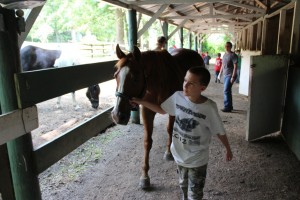Conversation Starters: He Disciplines the One He Loves
Posted by Teeny“Don’t be deceived: God is not mocked. For whatever a man sows he will also reap, because the one who sows to his flesh will reap corruption from the flesh, but the one who sows to the Spirit will reap eternal life from the Spirt.” Galatians 6:7-8
How can you keep this conversation going at home? Try bouncing some of these questions around at the dinner table, as you’re driving your kids to school or an activity or even while you’re shopping together:
For Preschoolers
What are some of the rules we have in our house?
Why do we have those rules? Are they because we don’t want you to have any fun, or because we don’t want you to get hurt?
For Children
What do you think would happen if you were never punished when you did something wrong?
Do you think if we (your parents) loved you more, we wouldn’t discipline you as much? Why or Why not?
For Students
Talk with your teenager about the worst trouble you ever got into. What did you learn from it? How did your own parents discipline you?
Posted in Just For Parents | Tagged Camp Crestridge, Camp Crestridge for Girls, Camp Ridgecrest, Camp Ridgecrest for Boys, Conversation Starters, parent resourses, Ridgecrest Summer Camps | Leave a reply
Conversation Starters: Our Calling to His Purpose
Posted by Teeny “And we know that for those who love God all things work together for good, for those who are called according to his purpose.” Romans 8:28
“And we know that for those who love God all things work together for good, for those who are called according to his purpose.” Romans 8:28
How can you keep this conversation going at home? Try bouncing some of these questions around at the dinner table, as you’re driving your kids to school or an activity, or even while you’re shopping together:
For Preschoolers
What do you want to be when you grow up?
How can you show people you love God in that job?
For Children
In addition to the above questions, ask, How do you think you can tell if this is something God wants you to do with your life?
For Students
When you work on a group project, hod do you decide which idea to go with?
Is it sometimes hard to admit someone else might have a better idea than you? What do you do about it?
Posted in Just For Parents | Tagged Camp Crestridge, Camp Crestridge for Girls, Camp Parents, Camp Ridgecrest, Camp Ridgecrest for Boys, Conversation Starters, Ridgecrest Summer Camps | Leave a reply
Dads: Make Every Day Count
Posted by Phil Legendary football coach Vince Lombardi was well-known for a lot of things, most notably his passion for teamwork, commitment and success. Lombardi was driven to succeed, and he knew that winning required hard work and sacrifice.
Legendary football coach Vince Lombardi was well-known for a lot of things, most notably his passion for teamwork, commitment and success. Lombardi was driven to succeed, and he knew that winning required hard work and sacrifice.
“I firmly believe that any man’s finest hour,” Lombardi said, “the greatest fulfillment of all that he holds dear, is that moment when he has worked his heart out in a good cause and lies exhausted on the field of battle – victorious.”
As a father, my wife and children dominate the list of the things that I hold dear, and I will gladly lay exhausted on the field of battle for the cause of protecting and serving my family. I worked with at-risk kids for more than 20 years, and I’ve seen the positive role that dads play in the lives of their children. I’ve also witnessed firsthand the devastation that can occur when a child has no father figure in his or her life.
Assessing victory or defeat on the football field is relatively straightforward. It’s simply a matter of knowing the rules and how to keep score. Fatherhood is different. There is no off-season. No signing bonuses. No referees.
Yet victory is still possible.
One of the most effective parenting game plans is to simply take advantage of everyday opportunities to love our children and instill the right values in them. To be the best dad we can be is to make every day count.
So, where do we begin? We start with five key behaviors of a healthy, thriving family. These five behaviors demonstrate that small daily investments can make a big impact in a child’s life. They are prayer, laughter, time, conversation and dinner. Let’s look at each one:
Prayer: More than just praying for our children, prayer allows us to model for them the importance of taking our requests to a loving and gracious God. A few years ago, when I was without a job and our housing situation became unstable, our entire family sought the Lord together every day, and God provided for us in amazing ways. We continue to seek the Lord as a family (we have three young kids) to this day. Family prayer has drawn us closer to each other and to God.
Laughter: Modern science tells us that laughter has many benefits. It can increase blood flow, reduce stress and even help suppress pain. Laughter also has a profound impact on social interactions: Laughter connects us with others. Having fun as a family strengthens your relationships with your children and helps create positive memories. One of the regular ways we have fun is by watching our family videos. We make popcorn, laugh and reconnect as a family while we recall some of our favorite times together.
Time: We all have to choose how to occupy our limited free time, but you will never regret spending extra time with your children. (Watching TV together is not enough!) Ask yourself: Is the time we spend together as a family positive? Does it draw us closer together, or are we simply in the same home at the same time? In our home, Friday evenings are our regular family time. The kids look forward to it and each pick out a game for us to play. I also set aside one-on-one time with each of my kids. We call them “Date Nights With Dad,” which include activities like fishing, an evening at the park (with ice cream to follow, of course!) or a wagon ride around the neighborhood. Most of them involve little or no money – just lots of time together. Regular date nights also pave the way for a deeper and trusting relationship as our children grow.
Conversation: Talking is not always the same as conversing. A lot of family communication centers on superficial aspects of our lives such as managing daily schedules and whether or not we are keeping up with our regular duties (chores, homework, etc.). Do you ever set aside time to learn more about your children, to exchange ideas and opinions free from the regular interruptions of life? Can you name the “one thing” that gives meaning to your child’s life? Most parents can’t. Dads, if we don’t ask these questions – and actively listen to the answers – then we may never know our children’s fears and dreams.
Dinner: Researchers have found that family members who eat dinner together at least four times a week exhibit improved communication, healthier eating habits, higher grades and fewer problems with at-risk behaviors. The key to family dinners is keeping them free from distractions. Unplug from the world and pay attention to each other. One of the ways my family does this is by having everyone around the table share his or her “highs” (best thing of the day) and “lows” (low point of the day). Use dinnertime to engage in some of the other thriving family behaviors: time, prayer and conversation (and maybe even some laughter).
If your family is lacking in these behaviors, don’t despair. We all fall short as parents, but it’s never too late to start. No matter the ages of your children, begin today to take advantage of everyday interactions.
Maybe your children are grown and out of the house. You can still pray with them and for them, even if it’s over the phone. Invite them to dinner if they live nearby. Take the time to have a conversation about something other than the weather; maybe you’ll even get to share a few laughs.
It’s time to make every day count.
by Roy Baldwin To read the complete article, visit Focus on the Family…
Posted in Just For Parents | Tagged Camp Crestridge, Camp Ridgecrest, parent resources, Ridgecrest Summer Camps | Leave a reply
Conversation Starters: Obedience to Him
Posted by Teeny“Not everyone who says to me, ‘Lord, Lord,’ will enter the kingdom of heaven, but only the one who does the will of my Father who is in heaven.” Matthew 7:21
Conversation Starters
How can you keep this conversation going at home? Try bouncing some of these questions around at the dinner table, as you’re driving your kids to school or an activity, or even while you’re shopping together:
For Preschoolers
What are some rules that keep you safe?
Why do we have rules like this?
What are some of God’s rules? Did God give us rules to keep us from having fun, or because He loves us?
For Children
What are some rules you know we should follow?
Why should we obey these rules?
Is there more to being a Christian than just following rules? What else?
For Students
Why are relationships important?
How do rules protect relationships?
Honestly, how would you feel about a parent who had no rules or expectations for his children?
Posted in Just For Parents | Tagged Camp Crestridge, Camp Crestridge for Girls, Camp Parents, Camp Ridgecrest, Camp Ridgecrest for Boys, Conversation Starters, parent resourses, Ridgecrest Summer Camps | Leave a reply
Top Priority: Remembering Your Spouse
Posted by Phil “…When we were dating, it was very easy to make our relationship my number one priority, second only to God. I would anxiously await the mail every Tuesday because I would get letters or cards letting me know that I was being thought of. The weekends were spent hanging out with my now-husband and his best friend. We would rollerblade, go to the park, and spend time at the beach…building memories to last a lifetime. …
“…When we were dating, it was very easy to make our relationship my number one priority, second only to God. I would anxiously await the mail every Tuesday because I would get letters or cards letting me know that I was being thought of. The weekends were spent hanging out with my now-husband and his best friend. We would rollerblade, go to the park, and spend time at the beach…building memories to last a lifetime. …
Then we got married…first one, then two, and then three kids came. Work got busier, schedules filled up, and then we added the kids’ activities too…well, I don’t need to remind anyone about how crazy life can get. And, even though my husband is still the most important person to me besides God, I don’t always do such a great job showing him that. By the time the kids’ problems are resolved, laundry and other chores are completed, dinner cleaned up – where is there any time to make the one I love feel special? ”
Read more…. at Crosswalk.com
Posted in Just For Parents | Tagged Camp Crestridge, Camp Ridgecrest, marriage, parenting, Ridgecrest Summer Camps | Leave a reply
Baby Sitters and Body Guards
Posted by PhilWhat do the following positions have in common?
Babysitter.
Body Guard.
Manager.
Safety Net.
Advisor.
If you’re a parent, you’ve held them all or you will by the time your children dive from the nest. One day they will pay for their own phone lines and car insurance, schedule their own dentist appointments, drive through and pay for their own take-out, and do laundry in their own dorm rooms or apartments.
Read more …. from crosswalk.com
Posted in Just For Parents | Tagged Camp Crestridge, Camp Ridgecrest, parenting, Ridgecrest Summer Camps | Leave a reply
Should I Be Sending My Children to Camp
Posted by Phil An interesting article from Michael Thompson Ph.D
An interesting article from Michael Thompson Ph.D
Some six million children in the United States are preparing psychologically to go away to sleepaway camp. Whether these departing children are camp veterans or nervous rookies, they are mentally rehearsing being away from mom and dad, their comfortable beds, their pets, favorite meals and, of course, their beloved iPhones, Facebook and video games.
During the winter their parents made the decision — and found the money — to make it possible for their kids to leave their families and their comfortable homes so that they could spend a week or two or four in a rustic, more-or-less uncomfortable cabin getting bitten by mosquitoes. They will live with a bunch of other kids, some of whom are fantastic, others quite annoying. They will eat a balanced diet of grilled cheese sandwiches and Fudgesicles with the occasional corn dog for good measure. They will play fun but aimless games like “Capture the Flag” and sit around campfires watching hilarious, dumb skits that almost no one remembers two days later (except the authors, of course). They will master skills such as archery and kayaking, horseback riding and waterskiing, none of which will impress their varsity coach or their AP Bio teacher when they return to school.
While the campers are messing about in the woods, many of their peers will be attending summer school or specialized skills programs. Their responsible, if sometimes Tiger-ish, moms and dads will be investing their money in their children’s future differently, sending them to one-week soccer and lacrosse programs, SAT prep courses and unpaid internships designed to polish skills, boost scores and impress college admissions officers. Instead of spending three weeks at an all-around camp, these children will be focused on skill-building, sometimes in three different specialized programs to which their parents drive them every day (allowing time for that all-important debrief in the car going home).
Which set of parents has it right? Or more to the point: Does an overnight camp experience still make sense in this competitive, resume-building world? From this psychologist’s point of view, the answer is a resounding YES. I believe that children develop in profound ways when they leave their parents’ house and join a camp community.
Learning to sleep away from home is, of course, a critical step on the way to independence. Part of the challenge is beating homesickness, which may be hard for some children, and which, by definition, your parents cannot help you do. Kids know they have to do this sooner or later. As my son once remarked with horror, “If you can’t learn to sleep away from home, you have to live with your parents for the rest of your life.” But beyond that, there are things that, as a parent, you cannot do for your children, as much as you might wish to. You cannot make them happy (if you try too hard they become whiners); you cannot give them self-esteem and confidence (those come from their own accomplishments); you cannot pick friends for them and micro-manage their social lives, and finally you cannot give them independence. The only way children can grow into independence is to have their parents open the door and let them walk out. That’s what makes camp such a life-changing experience for children.
Finish the Article by clicking here…
by Michael Thompson Ph.D
Author “Homesick and Happy”
Posted in Just For Parents | Tagged Camp Crestridge, Camp Ridgecrest, Just for Parents, parent resourses, Ridgecrest Summer Camps, sleepaway camps, summer camp | Leave a reply
Conversation Starter: Let Your Heart Be Broken
Posted by Phil Jeremiah 8:4-13,18–9:1
Jeremiah 8:4-13,18–9:1
join God in His concern for the moral/spiritual condition of others
Conversation Starters
How can you keep this conversation going at home? Try bouncing some of these questions around at the dinner table, as you’re driving your kids to school or an activity, or even while you’re shopping together:
For Preschoolers
What makes you sad?
What does it feel like to be sad?
How can you be nice to people who are sad (and broken hearted)?
For School-Age
Ask you children what makes them sad and how it feels to be sad?
Invite your children to discuss what it means to have compassion and a heart that is broken for the needs of other people.
How can we as a family reach out and care for and serve the broken hearted?
For Students
Who are the people you know who have experienced heartache and a broken heart?
How do you care for someone and serve someone who has experienced great pain and loss?
What are the things that break your heart and cause you to feel great compassion? How do you think God feels about those things?
Posted in Just For Parents | Tagged 18–9:1, Camp Crestridge, Camp Ridgecrest, Jeremiah 8:4-13, Ridgecrest Summer Camps | Leave a reply
When Kids Lie
Posted by Phil Just yesterday morning, it was a Monday, we were making sure lunches were packed and teeth were brushed before Piper and I rushed out the door to take her to school. I was quickly walking into the kitchen when I stopped at the door and my eyes locked with the eyes of my youngest daughter, Lily. She was caught “red handed” pouring her breakfast into the trash can. While I fought back the smile, I just stood and stared at her. She knew right away that she was busted. Her plan wasn’t hard to figure out… quickly pour out my cereal, leave the empty bowl on the table, tell Mom and Dad that I had eaten it all. Peace of cake.
Just yesterday morning, it was a Monday, we were making sure lunches were packed and teeth were brushed before Piper and I rushed out the door to take her to school. I was quickly walking into the kitchen when I stopped at the door and my eyes locked with the eyes of my youngest daughter, Lily. She was caught “red handed” pouring her breakfast into the trash can. While I fought back the smile, I just stood and stared at her. She knew right away that she was busted. Her plan wasn’t hard to figure out… quickly pour out my cereal, leave the empty bowl on the table, tell Mom and Dad that I had eaten it all. Peace of cake.
I am aware, by the way, that this is a “little lie” and not a big deal. But somehow it was significant. This was one of the first times Lily had bold-faced-lied to me, or had at least planned to lie to me on purpose. And I couldn’t be happier how it played out. Catching your kids in a lie is precious, especially if we can catch them before they get too old, and it becomes one of their habits.
Plus, let’s be honest, kids beginning to lie to us isn’t all bad. They are starting to think for themselves…to make their own decisions… and to realize that Mommy and Daddy don’t know everything and don’t see everything. This is a good step to growing up!
So what do you do? How do you react to some of their first lies? Its a challenging question with lots of right answers, so here is what I did. I made a bid deal out of the lie. Who cares about the cereal, but the lie is the thing to focus on. There were 3 things I stressed when I sat on the floor to talk with Lily, wiping the tears from her cheeks.
1. In a very calm and loving tone I wanted Lily to know how sad it made me that she would lie to me. Oh, how it hurt my feelings that she wanted to tell me something that wasn’t true. I probably tried to say this same thing in 3 or 4 different ways to make sure she understood that we did not want her to lie…ever.
2. The second thing I wanted Lily to know was that she could always tell me anything. I would always listen and help her. She doesn’t need to be afraid to tell Mom or Dad the scary or hard things. We won’t turn our backs on her. We love her.
3. The last thing I wanted Lily to know was that not only do we love her, but Jesus loves her too, even more than we do! And Jesus can forgive her just like Mom and Dad.
Simple I know. Nothing ground breaking. But if we aren’t intentional, we end up telling our kids all kinds of stuff, especially in moments of frustration.
Do you have any comments or words of wisdom about when your kids lied to you? Any great stories? What about when kids get older? Comment below…
Phil Berry
Ridgecrest Summer Camps
Posted in Just For Parents | Tagged Camp Crestridge, Camp Ridgecrest, Just for Parents, kids lie, parent resources, Phil Berry, Ridgecrest Summer Camps | Leave a reply
How Your Teen is Wired
Posted by Phil Parents,
Parents,
Here are some tangible ideas to help you connect with your teen… Don’t try to make the conversation too serious. Enjoy this article from Focus on the Family by Joe White, Larry Weeden
Is your teen on the track to a meaningful future? Are you finding out what a joy it can be to help make the most of how God has wired him or her?
Many of us want to help our teens dream big, fulfilling, God-honoring dreams. But how do we do that?
The first step is to understand the great experiment known as your teen. In all of human history, there’s never been another person with your teen’s exact mix of God-given personality, talents, interests and spiritual gifts. As the two of you get to know that unique wiring through self-tests like the ones in the book Wired by God, you’ll start to see which kinds of dreams might make a good fit.
Your Teen’s Basic Bent
Here are some questions you can use anytime to find out how God has wired your young person:
- “What really drives you?”
- “What’s the most fun you’ve ever had helping someone else?”
- “What dreams do you think God has given you?”
- “What can you do that most people can’t?”
- “What ability would you most like to develop? Why?”
- “If God hired you for a summer job, what would you hope it would be? Why?”
And this one from Doug Fields, a youth pastor: “If you could design a specific way to serve God and knew you wouldn’t fail, what would you do?”
Remember that your purpose is to listen and learn, to better understand and appreciate your teen’s uniqueness. This is not the time for lectures and advice. Figuratively speaking, you need to have big ears and a small mouth, tough skin and a tender heart.
Another way to learn by questioning is to talk with others in your teen’s life: teachers, youth group leaders, coaches, school counselors, Scout leaders, Sunday school teachers, parents of close friends. Ask what they’ve observed about your child’s likes and dislikes, interests and passions, abilities and aptitudes.
Often these people will confirm your own observations. Sometimes, though, they’ll describe a side of your teen that you hadn’t noticed — or offer an insight you’d overlooked.
Your Teen’s Interests and Passions
Here’s a way to help your teen pinpoint his or her interests and natural abilities. It’s based on “The Vision Quest,” a tool developed by Tim Sanford, a counselor at Focus on the Family who works with a lot of young people.
Give your teen these instructions:
On a piece of paper, list the things you’ve done since the fourth grade. We’re talking about academics, sports, social events, the arts, student government, hobbies, interaction with family and friends, personal adventures, youth activities, socials, special events, camps, worship, leadership, volunteer work, mission trips, “helping out,” clubs, service projects, job duties, volunteer or assigned tasks, and chores.
You don’t have to compile your whole list at once. Allow two or three weeks, adding to it as new memories come to mind. If you don’t know whether to include something in the list, go ahead and put it down anyway.
Now give each activity a “positive” or a “negative” rating. How did it turn out? How did it affect you?
After several days, pull your worksheet out and think again about the events to which you gave a negative value. Look for patterns. For example, if events connected with mechanical things (fixing the car, building something, helping with props at the school play) consistently ended in disaster, you’re probably not the mechanical type.
Now move to the positive side of the worksheet. Ask yourself the questions below as you look over those events.
- “Is there a pattern or anything these events have in common?”
- “Are some of the activities things I’d like to pursue more?”
- “How can I begin doing more of these kinds of activities?”
- “What kinds of qualities, talents, character traits and skills do these activities require?”
- “Do I have some of those qualities and traits?”
- “Are any circumstances or events missing from my worksheet? If so, what are they, and why might they be missing?”
- “Are there any activities I’ve never done before, but I’d like to try?”
Posted in Just For Parents | Tagged Camp Crestridge, Camp Ridgecrest, Focus on the Family, parenting, Ridgecrest Summer Camps | Leave a reply


